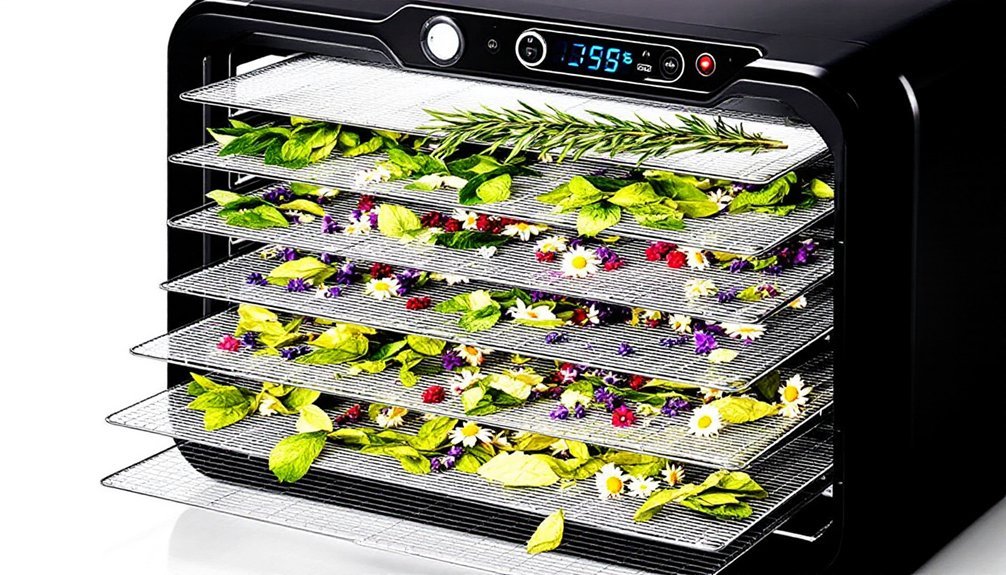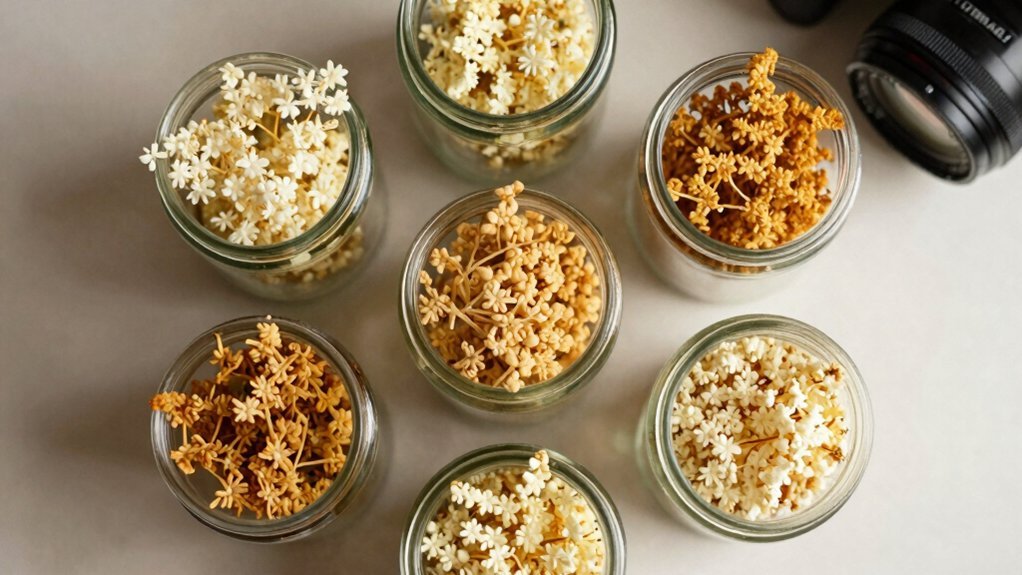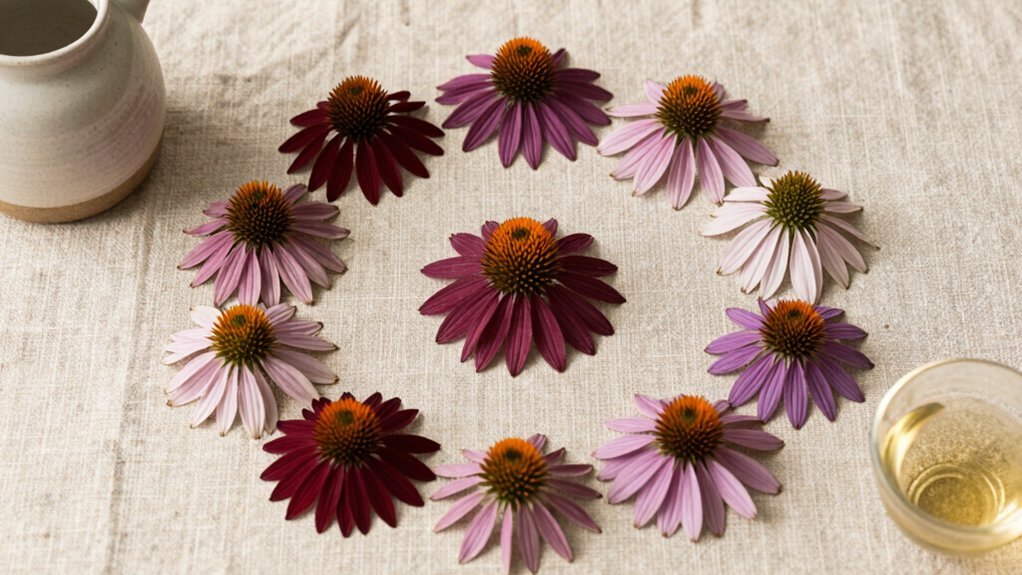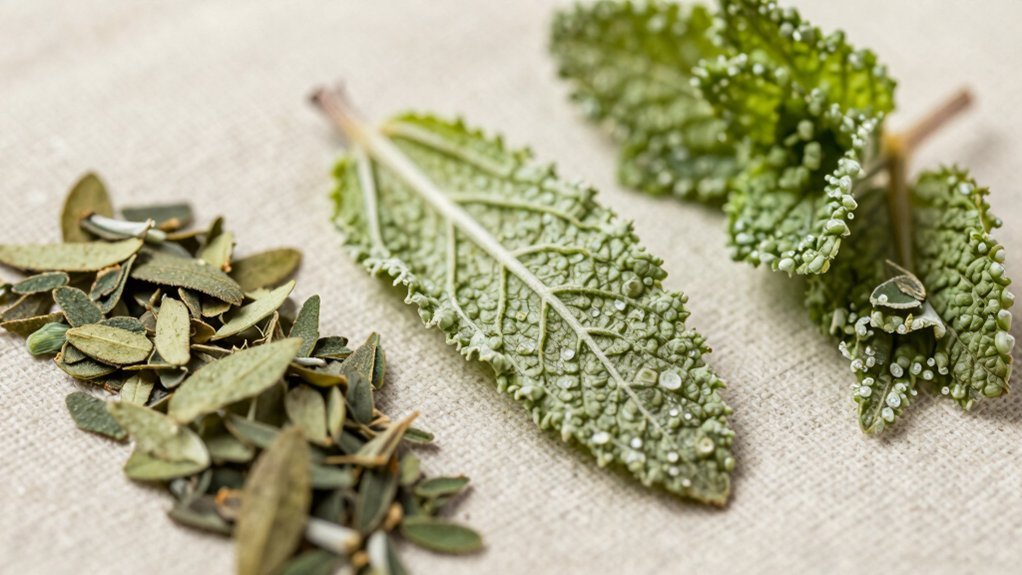If you're passionate about crafting your own tea blends, you'll need the right dehydrator to preserve your herbs' flavors and medicinal properties. While many options exist on the market, not all dehydrators are created equal when it comes to processing delicate leaves and flowers. From temperature precision to airflow distribution, specific features can make or break your DIY tea-making experience. Let's explore five top-rated dehydrators that'll transform your kitchen into a personal tea workshop.
Food Dehydrator Machine, 12 Stainless Steel Trays for Jerky and Meat
For tea enthusiasts seeking professional-grade herb drying, the Tinzida Food Dehydrator stands out with its 12 spacious stainless steel trays and precise temperature control from 95ºF to 194ºF.
You'll appreciate the digital control panel that lets you adjust drying times from 30 minutes to 24 hours. The full glass door and interior lighting make it easy to monitor your herbs' progress. With 800 watts of power and a quiet back-panel fan, you'll get efficient, even drying for your tea ingredients.
The BPA-free, dishwasher-safe trays measure 12.2×10.2 inches, giving you ample space for large batches. Plus, the automatic power-off feature guarantees safe operation during extended drying sessions.
Best For: Tea and herb enthusiasts who need a large-capacity, precise dehydrator for processing multiple batches of dried ingredients with professional-grade results.
Pros:
- Large capacity with 12 spacious stainless steel trays for bulk processing
- Precise temperature control (95ºF-194ºF) with digital interface and 24-hour timer
- Easy monitoring through glass door with interior lighting and quiet operation
Cons:
- Relatively heavy at 29.9 pounds, making it less portable
- Takes up significant counter space (16.2D x 13.4W x 17.3H inches)
- Lacks included temperature guide in manual for different ingredients
Food Dehydrator Machine with 8 Stainless Steel Trays, 500W
Tea enthusiasts seeking professional-grade drying capability will find their match in the Cercker Food Dehydrator Machine. With eight BPA-free stainless steel trays and a powerful 500W motor, you'll efficiently dry your favorite tea herbs at precise temperatures between 70-190°F.
You'll appreciate the unit's quiet operation at ≤45dB and its advanced air circulation system running at 2 m/s. The 24-hour timer lets you set and forget your drying projects, while the 5°F temperature increments guarantee superior results for delicate herbs. Plus, cleanup's a breeze with dishwasher-safe trays. At 18.21 pounds with a sleek silver finish, it's both sturdy and stylish for your kitchen counter.
Best For: Tea enthusiasts, herbalists, and home food preservers who need precise temperature control and substantial drying capacity in a quiet, professional-grade machine.
Pros:
- Precise temperature control with 5°F increments and wide range (70-190°F) for optimal drying of delicate herbs
- Large capacity with 8 dishwasher-safe stainless steel trays for efficient batch processing
- Quiet operation (≤45dB) with advanced air circulation system for consistent drying results
Cons:
- Relatively heavy at 18.21 pounds, which may make it difficult to move or store
- Higher price point compared to basic dehydrators
- Some users report issues with temperature control accuracy and initial product condition
Elite Gourmet Food Dehydrator EFD319
Hobbyist herb growers seeking an entry-level dehydrator will find the Elite Gourmet EFD319 a practical choice. With five BPA-free trays and adjustable temperatures from 95ºF to 158ºF, you'll have enough flexibility to dry various herbs for your tea blends.
The unit's horizontal airflow guarantees even drying, while its viewing window lets you monitor your herbs' progress. You won't need much counter space, as this 350-watt dehydrator measures just 11.4 inches in width and depth. The dishwasher-safe trays make cleanup hassle-free, though you might experience longer drying times compared to higher-powered models. For small-batch tea making, this ETL-listed dehydrator offers good value with its one-year warranty.
Best For: Entry-level herb enthusiasts and small-batch tea makers seeking an affordable, compact dehydrator for occasional use.
Pros:
- Compact size with 5 dishwasher-safe trays fits well in small kitchens
- Clear viewing window allows easy monitoring of drying progress
- Simple temperature controls and operation make it user-friendly
Cons:
- Longer drying times compared to more powerful dehydrators
- Limited capacity may not suit bulk drying needs
- Some users report temperature accuracy issues
Magic Mill Pro Food Dehydrator (7 Tray, Digital Control)
This high-capacity dehydrator is ideal for ambitious tea crafters who need to process large batches of herbs efficiently. With seven stainless steel trays and rear-mounted fan technology, you'll get even drying without rotating shelves. The digital controls let you set precise temperatures and times for different herbs.
You'll appreciate the transparent door for monitoring your herbs' progress and the automatic shut-off feature when drying is complete. The BPA-free construction guarantees your tea ingredients remain pure and safe. While it's pricier than basic models, the Magic Mill Pro's consistent performance and large capacity make it worth considering if you're serious about DIY tea making.
Best For: Serious tea crafters and herb enthusiasts who need to process large batches of dried ingredients regularly and value precise temperature control and consistent results.
Pros:
- Large capacity with 7 stainless steel trays allows for processing multiple herbs simultaneously
- Digital controls with timer and auto shut-off provide precise temperature management
- Even heat distribution with rear-mounted fan eliminates need for tray rotation
Cons:
- Higher price point compared to basic dehydrator models
- Relatively large footprint may require significant counter or storage space
- Some users report concerns about long-term durability and customer service issues
OSTBA Food Dehydrator with 5 BPA-Free Trays
Crafting homemade tea blends becomes effortless with the OSTBA Food Dehydrator, a compact powerhouse that's perfect for small-batch tea enthusiasts. You'll appreciate its precise temperature control (95-158℉) and 360° airflow, ensuring your herbs dry evenly without losing their essential oils.
The unit's five BPA-free trays provide ample space for drying multiple herbs simultaneously, while the transparent cover lets you monitor the process. You won't need much counter space, as its 9.45 x 10.24 x 8.27-inch footprint fits neatly in most kitchens. While it doesn't include a fruit leather tray, cleanup is a breeze with dishwasher-safe components, and the quiet operation won't disturb your tea-making zen.
Best For: Home tea enthusiasts and herb gardeners looking for a compact, user-friendly dehydrator to create small batches of dried herbs and custom tea blends.
Pros:
- Precise temperature control and 360° airflow ensure even drying while preserving essential oils
- Compact design with 5 BPA-free trays fits easily on countertops while offering decent capacity
- Simple operation and dishwasher-safe components make it user-friendly and easy to clean
Cons:
- Lacks a dedicated fruit leather tray for additional versatility
- Completion alarm can be annoying and disruptive
- Some users report longer dehydration times compared to other models
Factors to Consider When Choosing an Herb Dehydrator for DIY Tea Making
When selecting an herb dehydrator for your tea-making endeavors, you'll need to evaluate key features like temperature control range and airflow distribution to guarantee proper drying of different herbs. You should consider the unit's size and storage requirements, along with its energy efficiency, as these factors will impact both your workspace and utility costs. The quality of tray materials also matters greatly, as you'll want BPA-free, durable surfaces that won't contaminate your herbs or break down over time.
Temperature Control Range
Among the most critical features of an herb dehydrator, temperature control range directly impacts the quality of your DIY tea herbs. You'll want to look for a dehydrator that operates between 95ºF and 158ºF, as this range is ideal for preserving the essential oils and flavors that make your tea flavorful and potent.
While some models can reach up to 190ºF, you won't need these higher temperatures for herbs. Instead, focus on finding a dehydrator with adjustable settings in 5ºF or 10ºF increments, allowing you to fine-tune the temperature for different herbs. Look for units with rear-mounted fans for even heat distribution and a timer that can run up to 24 hours. These features guarantee your herbs dry consistently and maintain their therapeutic properties throughout the process.
Size and Storage Space
Beyond temperature settings, the physical dimensions of your herb dehydrator will substantially impact your tea-making setup. You'll find models ranging from compact units at 9.45 x 10.24 x 8.27 inches to larger ones measuring 16.2 x 13.4 x 17.3 inches, so consider your available counter and storage space carefully.
The number of trays you'll need affects both capacity and footprint, with options varying from 5 to 12 trays. If portability matters, look for lighter models under 5 pounds rather than heavier 29.9-pound units. You'll also want to check how efficiently the trays stack when not in use, as this can save valuable storage space. For occasional tea making, a compact model might suffice, but if you're planning frequent herb drying sessions, you'll benefit from a larger unit—provided you have the space.
Energy Usage Efficiency
Since energy costs can greatly impact your tea-making budget, understanding your dehydrator's power consumption is essential. Before purchasing, check the wattage range, which typically falls between 240W and 800W. Lower wattage models can help reduce your electricity bills during frequent use.
You'll want to look for models with adjustable temperature settings between 95ºF and 158ºF, letting you optimize energy use for different herbs. A 24-hour timer feature prevents unnecessary power consumption by automatically shutting off once your herbs are properly dried. Consider units with advanced air circulation systems, as they distribute heat more evenly and reduce drying time. If you're only making small batches of tea, opt for compact dehydrators – they're not just space-efficient but typically use less power than larger models.
Tray Material Quality
While optimizing energy usage can save money, the quality of your dehydrator's trays directly impacts the safety and flavor of your tea. You'll want to guarantee your dehydrator features BPA-free trays to prevent harmful chemicals from contaminating your herbs during the drying process.
Stainless steel trays are your best option, as they're durable, resist corrosion, and handle herb oils effectively. When selecting your dehydrator, look for models with multiple trays and adjustable heights, allowing you to dry different herbs simultaneously while guaranteeing proper airflow. This flexibility lets you accommodate various herb sizes and maximize your drying capacity.
Don't overlook the importance of dishwasher-safe trays – they'll make cleaning much easier and help prevent flavor transfer between different herbs, maintaining the purity of your tea blends.
Airflow Distribution System
A reliable airflow distribution system serves as the heart of any herb dehydrator, making it essential for producing high-quality DIY teas. You'll want to look for models with rear-mounted fans, as they deliver superior heat circulation across all trays, ensuring your herbs dry evenly without developing moisture pockets that can compromise flavor.
Consider dehydrators featuring horizontal airflow technology, which not only reduces drying time but also helps preserve your herbs' essential oils. You won't need to rotate trays as frequently with an efficient airflow system, saving you time and effort. When shopping, prioritize models offering adjustable airflow settings – this flexibility lets you fine-tune the drying process based on different herbs' moisture content. The right airflow system will help you achieve consistent results in your tea-making endeavors.
Timer and Auto-Shutdown
Beyond efficient airflow, smart timing controls take your herb dehydration to the next level. You'll find flexible timer settings ranging from 30 minutes to 24 hours, letting you precisely control drying times for different herbs in your tea-making journey.
Digital controls make it easy to monitor and adjust both time and temperature settings as needed. You won't have to worry about over-drying your herbs, as the auto-shutdown feature automatically turns off the dehydrator once your set time is reached. This safety feature not only prevents potential hazards from overheating but also helps preserve your herbs' essential oils and flavors. Whether you're drying delicate mint leaves or heartier root herbs, you can customize drying times to achieve ideal results in your DIY tea creations.
Cleaning and Maintenance
Proper cleaning and maintenance should be top priorities when selecting an herb dehydrator for your tea-making endeavors. You'll want to choose a model with dishwasher-safe trays that make post-drying cleanup quick and hassle-free.
Look for units featuring a transparent cover, which lets you monitor your herbs without opening the dehydrator and risking contamination. When shopping, prioritize models with stainless steel housing that you can easily wipe clean. Additionally, select dehydrators with minimal assembly requirements and removable components to simplify the cleaning process.
Don't forget that regular cleaning after each use is crucial to prevent flavor-altering residue buildup. This practice will not only maintain the quality of your dried herbs but also extend your dehydrator's lifespan and guarantee consistent performance.
Frequently Asked Questions
How Long Do Dried Herbs Stay Fresh When Stored Properly?
You'll find your dried herbs stay fresh for 1-3 years when you store them in airtight containers away from light, heat, and moisture. They're best used within the first year for peak flavor.
Can I Mix Different Herbs in the Same Dehydrator Tray?
You can mix different herbs on the same tray, but it's best to group ones with similar drying times together. Don't mix strong-smelling herbs with mild ones, as they can transfer flavors during drying.
What Temperature Should I Use for Drying Medicinal Herbs?
You'll want to dry medicinal herbs at low temperatures between 95-115°F to preserve their therapeutic properties. Don't exceed 125°F, as higher temperatures can destroy essential oils and beneficial compounds in your herbs.
Are Dehydrated Tea Herbs as Nutritious as Fresh Ones?
You'll retain most nutrients when properly dehydrating herbs, though some vitamins may decrease slightly. If you dry them at low temperatures and store them correctly, they'll maintain much of their nutritional value and medicinal properties.
Should Herbs Be Washed Before Dehydrating for Tea Making?
Yes, you'll need to wash your herbs before dehydrating to remove dirt, bugs, and pesticides. After washing, gently pat them dry with paper towels to remove excess moisture before starting the dehydration process.





Leave a Reply